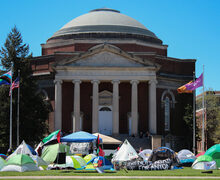Part-time faculty will vote to potentially form union
Syracuse University professor Maureen Fitzsimmons said she wants to provide her students with a quality education, and she wants a better way to do it.
As a part-time professor, Fitzsimmons will be one of the approximately 600 part-time faculty members at SU eligible to vote to be a member of Adjuncts United, an affiliate of the New York State United Teachers and the American Federation of Teachers.
Voting ballots, which are due Dec. 19, will allow part-time professors to decide if they want to collectively form the union or work individually with the university.
‘So many courses are taught by adjunct and part-time professors and (the union ensures) that professors are treated fairly and uniformly,’ said Fitzsimmons, a senior part-time professor for SU’s writing program.
In the most recent study, conducted in 2001, the University Senate Ad-Hoc Committee on Part-Time Teaching reported that more than 70 part-time faculty members have a salary that is below the federal poverty level. About 180 part-time faculty members earn under $18,000 per 24 credits.
All part-time, non-tenure-track faculty members who work as an adjunct or part time and have taught at least three credit hours in any semester since 2004 can vote for the union.
‘It’s for adjuncts interested in working collectively to improve job conditions in their work,’ said David Thomas, an organizer for Adjuncts United.
If there is a majority of votes for the union after they are tallied by the National Labor Relations Board on Dec. 20, negotiations for a contract with the university will begin.
A great number of part-time professors do not have access to compensation packages and health and retirement benefits, Thomas said, and the union allows these professors to have more power uniting collectively.
SU’s 13 schools and colleges differ on what they offer to their temporary part-time instructors, Fitzsimmons said, leaving many to deal with contract negotiations each semester.
Some members of the university are concerned the union’s involvement may create tension among part-time instructors since positions differ widely and unions tend to have all employers treated the same.
‘An introduction of a union makes it a little more difficult for us to address the needs and issues part-time instructors have,’ said Michael Flusche, associate vice chancellor for academic affairs.
While one union, the Service Employees International Union Local 200 United, represents around 750 employees in various areas on campus, including Food Services and library aides and assistants, Adjuncts United would be the first union for any instructors, as full-time tenured instructors are not unionized.
Flusche said unionization may complicate situations because the university would not be able to deal with individual instructors because the union will represent them.
‘It will be difficult to be responsive,’ Flusche said.
But for Fitzsimmons, she said she hopes all part-time professors will be given equal treatment in order to serve students best.
‘For students to get a quality education, professors need not to worry if they’ll be teaching next semester,’ she said.
Published on December 17, 2005 at 12:00 pm




